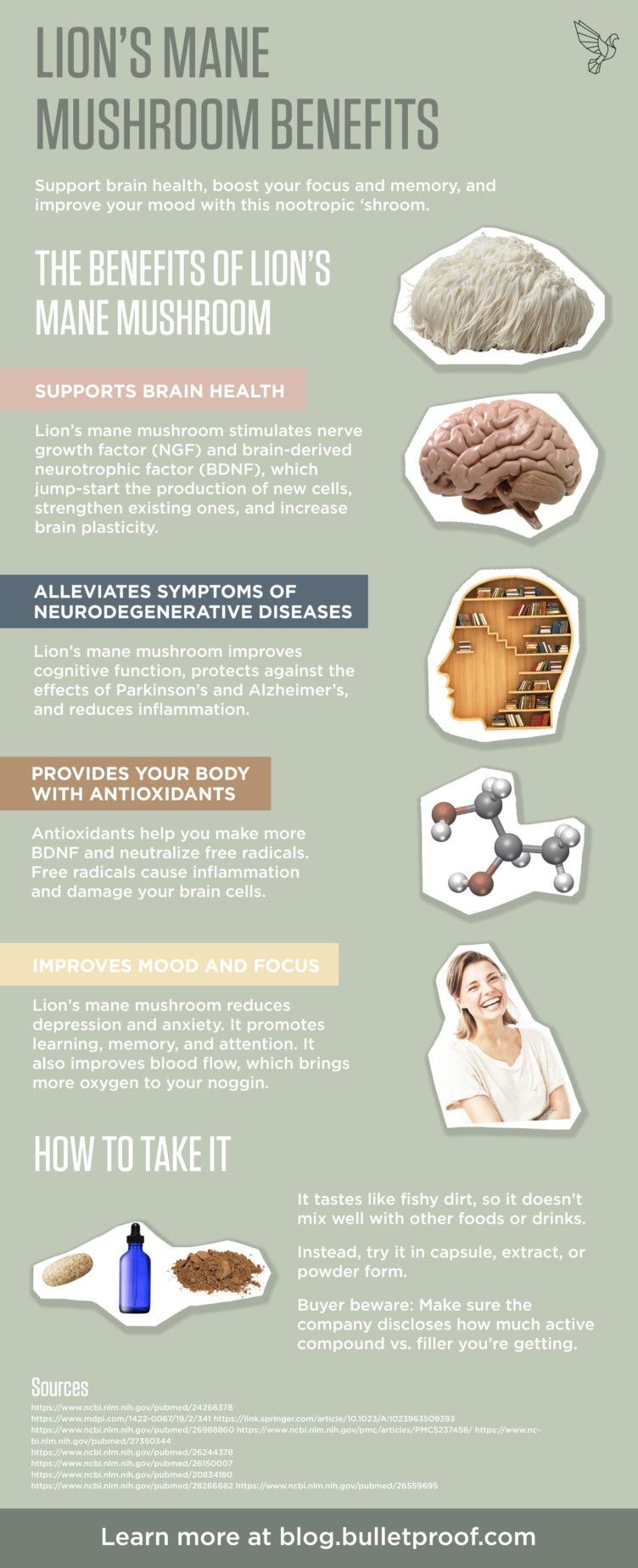
Lion’s Mane Mushrooms: 10 Health Benefits and Side Effects
Lion’s Mane mushrooms are shaggy white mushrooms known for their unique appearance and numerous health benefits. These include fighting cognitive impairment, reducing memory loss, relieving mild anxiety and depression, and providing other advantages.
Lion’s Mane mushrooms have both culinary and medicinal uses, and can be eaten raw, cooked, or enjoyed as tea. Research has shown that these mushrooms have the potential to improve various aspects of health.
The health benefits of Lion’s Mane mushrooms are attributed to their bioactive compounds, which have positive effects on the gut, heart, and brain.
1. Fight cognitive impairment
As we age, our brain’s ability to retain information declines. Lion’s Mane mushrooms contain hericenones and erinacines, which stimulate the growth of brain cells and may help prevent mental decline.
2. Reduce memory loss
Studies in mice have shown that Lion’s Mane mushrooms can effectively reduce symptoms of memory loss. These mushrooms have the potential to prevent neuron damage caused by amyloid-beta plaques, which are linked to Alzheimer’s disease.
3. Relieve mild anxiety and depression
Anxiety and depression are common mental health conditions, often caused by chronic inflammation. Lion’s Mane mushrooms have anti-inflammatory properties that can help lower symptoms of anxiety and depression, as seen in studies conducted on mice.
4. Protect against stomach ulcers
Stomach ulcers can be caused by the excessive growth of H.pylori bacteria, which damage the stomach’s mucous layer. Lion’s Mane mushroom extract can inhibit the growth of this bacteria, potentially preventing ulcer formation in the digestive tract.
5. Reduce recovery time for brain injuries
Studies in rats have shown that Lion’s Mane mushrooms can accelerate the recovery of brain injuries by stimulating nerve cell repair and growth. In fact, these mushrooms can increase recovery time by up to 41% in rats with brain injuries.
6. Lower the risk of heart disease
High triglyceride levels are a risk factor for heart disease. Lion’s Mane mushrooms have been found to effectively lower triglyceride levels and aid in fat metabolism, potentially reducing the risk of heart disease.
7. Might have anticancer effects
Lion’s Mane mushrooms show promise in fighting cancer, as they have been found to induce the death of cancer cells in various types of cancer, including blood, liver, stomach, and colon cancer.
8. Help in diabetes management
Lion’s Mane mushrooms can help manage diabetes by lowering blood sugar levels. Studies in mice have shown that these mushrooms effectively reduce blood glucose levels, even at low doses.
9. Strengthen the immune system
Lion’s Mane mushrooms have been shown to improve the functioning of the immune system, particularly in the intestinal immune system. They help protect against disease-causing agents that enter the body through the nose or mouth.
10. Lower oxidative stress and inflammation
Lion’s Mane mushrooms have antioxidant and anti-inflammatory properties, making them effective in reducing oxidative stress and chronic inflammation. In fact, they are among the most effective mushrooms in combating oxidative stress.
Side effects of Lion’s Mane mushrooms
While Lion’s Mane mushrooms have shown many potential health benefits, it’s important to note that most studies have been conducted on animals. There is currently limited research on the side effects of these mushrooms in humans. However, they are generally considered safe even at high doses.
Individuals who are sensitive or allergic to other mushroom species should exercise caution when consuming Lion’s Mane mushrooms, as they may experience similar effects. Skin rashes and impaired breathing have been reported in some cases, likely due to allergies.
QUESTION
Biomedical Research: "Effects of Hericium erinaceus on amyloid ß(25-35) peptide-induced learning and memory deficits in mice."
Bioscience, Biotechnology, and Biochemistry: "Yamabushitake mushroom (Hericium erinaceus) improved lipid metabolism in mice fed a high-fat diet."
BMC Complementary Medicine and Therapies: "Antihyperglycemic and antihyperlipidemic activities of aqueous extract of Hericium erinaceus in experimental diabetic rats."
Contact Dermatitis: "Occupational allergic contact dermatitis from the mushroom White Pom Pom (Hericium erinaceum)."
Evidence-based Complementary and Alternative Medicine: "Evaluation of Selected Culinary-Medicinal Mushrooms for Antioxidant and ACE Inhibitory Activities."
Evidence-based Complementary and Alternative Medicine: "Peripheral Nerve Regeneration Following Crush Injury to Rat Peroneal Nerve by Aqueous Extract of Medicinal Mushroom Hericium erinaceus (Bull.: Fr) Pers. (Aphyllophoromycetideae)."
Food & Function: "Immunomodulatory effects of Hericium erinaceus derived polysaccharides are mediated by intestinal immunology."
Food and Chemical Toxicology: "Evaluation of the toxicological safety of erinacine A-enriched Hericium erinaceus in a 28-day oral feeding study in Sprague-Dawley rats."
Food Chemistry: "Isolation and identification of aromatic compounds in Lion’s Mane Mushroom and their anticancer activities."
International Journal of Medicinal Mushrooms: "Anti-Gastric Ulcer Activity of Polysaccharide Fraction Isolated from Mycelium Culture of Lion’s Mane Medicinal Mushroom, Hericium erinaceus (Higher Basidiomycetes).", "Lion’s Mane, Hericium erinaceus and Tiger Milk, Lignosus rhinocerotis (Higher Basidiomycetes) Medicinal Mushrooms Stimulate Neurite Outgrowth in Dissociated Cells of Brain, Spinal Cord, and Retina: An In Vitro Study.", "Neurotrophic properties of the Lion’s mane medicinal mushroom, Hericium erinaceus (Higher Basidiomycetes) from Malaysia."
International Journal of Molecular Science: "The Neuroprotective Properties of Hericium erinaceus in Glutamate-Damaged Differentiated PC12 Cells and an Alzheimer’s Disease Mouse Model."
Journal of Agricultural and Food Chemistry: "Chemistry, Nutrition, and Health-Promoting Properties of Hericium erinaceus (Lion’s Mane) Mushroom Fruiting Bodies and Mycelia and Their Bioactive Compounds."
Journal of Ethnopharmacology: "Anticancer potential of Hericium erinaceus extracts against human gastrointestinal cancers."
Journal of Gastroenterology and Hepatology: "A multicenter prospective study on the prevalence of Helicobacter pylori-negative and nonsteroidal anti-inflammatory drugs-negative idiopathic peptic ulcers in Japan."
Molecular Medicine Reports: "Composition and antioxidant activity of water-soluble oligosaccharides from Hericium erinaceus."
Mycobiology: "Hypolipidaemic Effect of Hericium erinaceum Grown in Artemisia capillaris on Obese Rats."
Pharmacology, Biochemistry, and Behavior: "Effects of amycenone on serum levels of tumor necrosis factor-a, interleukin-10, and depression-like behavior in mice after lipopolysaccharide administration."


